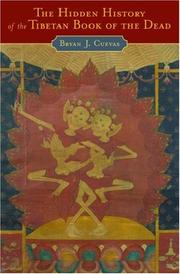| Listing 1 - 2 of 2 |
Sort by
|
Book
ISBN: 1782685642 1282976389 9786612976384 1400838045 0691134359 9780691134352 9781400838042 9781282976382 Year: 2011 Publisher: Princeton Princeton University Press
Abstract | Keywords | Export | Availability | Bookmark
 Loading...
Loading...Choose an application
- Reference Manager
- EndNote
- RefWorks (Direct export to RefWorks)
The Tibetan Book of the Dead is the most famous Buddhist text in the West, having sold more than a million copies since it was first published in English in 1927. Carl Jung wrote a commentary on it, Timothy Leary redesigned it as a guidebook for an acid trip, and the Beatles "ed Leary's version in their song "Tomorrow Never Knows." More recently, the book has been adopted by the hospice movement, enshrined by Penguin Classics, and made into an audiobook read by Richard Gere. Yet, as acclaimed writer and scholar of Buddhism Donald Lopez writes, "The Tibetan Book of the Dead is not really Tibetan, it is not really a book, and it is not really about death." In this compelling introduction and short history, Lopez tells the strange story of how a relatively obscure and malleable collection of Buddhist texts of uncertain origin came to be so revered--and so misunderstood--in the West. The central character in this story is Walter Evans-Wentz (1878-1965), an eccentric scholar and spiritual seeker from Trenton, New Jersey, who, despite not knowing the Tibetan language and never visiting the country, crafted and named The Tibetan Book of the Dead. In fact, Lopez argues, Evans-Wentz's book is much more American than Tibetan, owing a greater debt to Theosophy and Madame Blavatsky than to the lamas of the Land of Snows. Indeed, Lopez suggests that the book's perennial appeal stems not only from its origins in magical and mysterious Tibet, but also from the way Evans-Wentz translated the text into the language of a very American spirituality.
Buddhism. --- Death - Religious aspects. --- Death --Religious aspects --Comparative studies. --- Future life. --- Future life --Comparative studies. --- Karma-glin-pa. --- Death --- Future life --- Religion --- Philosophy & Religion --- Buddhism --- Religious aspects --- Karma-gliṅ-pa, --- Karma-glin-pa, --- Death - Religious aspects - Comparative studies. --- Future life - Comparative studies. --- Karma-glin-pa, - active 14th century. - Bar do thos grol.

ISBN: 0195154134 9780195154139 Year: 2003 Publisher: New York (N.Y.): Oxford university press
Abstract | Keywords | Export | Availability | Bookmark
 Loading...
Loading...Choose an application
- Reference Manager
- EndNote
- RefWorks (Direct export to RefWorks)
In 1927, Oxford University Press published the first western-language translation of a collection of Tibetan funerary texts (the Great Liberation upon Hearing in the Bardo) under the title The Tibetan Book of the Dead. Since that time, the work has established a powerful hold on the western popular imagination, and is now considered a classic of spiritual literature. Over the years, The Tibetan Book of the Dead has inspired numerous commentaries, an illustrated edition, a play, a video series, and even an opera. Translators, scholars, and popular devotees of the book have claimed to explain its esoteric ideas and reveal its hidden meaning. Few, however, have uttered a word about its history. Bryan J. Cuevas seeks to fill this gap in our knowledge by offering the first comprehensive historical study of the Great Liberation upon Hearing in the Bardo, and by grounding it firmly in the context of Tibetan history and culture. He begins by discussing the many ways the texts have been understood (and misunderstood) by westerners, beginning with its first editor, the Oxford-educated anthropologist Walter Y. Evans-Wentz, and continuing through the present day. The remarkable fame of the book in the west, Cuevas argues, is strikingly disproportionate to how the original Tibetan texts were perceived in their own country. Cuevas tells the story of how The Tibetan Book of the Dead was compiled in Tibet, of the lives of those who preserved and transmitted it, and explores the history of the rituals through which the life of the dead is imagined in Tibetan society. This book provides not only a fascinating look at a popular and enduring spiritual work, but also a much-needed corrective to the proliferation of ahistorical scholarship surrounding The Tibetan Book of the Dead.
Intermediate state --- Death --- Buddhist funeral rites and ceremonies --- Buddhism --- Religious aspects --- Karma-gliṅ-pa, --- Criticism, Textual --- 294.3*94 --- -Funeral rites and ceremonies, Buddhist --- -Intermediate state --- -Death --- Eschatology --- Future life --- Heaven --- Hell --- Purgatory --- Soul --- Funeral rites and ceremonies, Buddhist --- Funeral rites and ceremonies, Lamaist --- Funeral rites and ceremonies --- Dying --- End of life --- Life --- Terminal care --- Terminally ill --- Thanatology --- Lamaïsme --- -Buddhism --- Rituals --- Philosophy --- Karma-glin-pa --- -Criticism, Textual --- Buddhism. --- Karma-gliṅ-pa, --- Criticism, Textual. --- -Lamaïsme --- 294.3*94 Lamaïsme --- -294.3*94 Lamaïsme --- Religious aspects&delete& --- Intermediate state - Buddhism --- Death - Religious aspects - Buddhism --- Buddhist funeral rites and ceremonies - China - Tibet Autonomous Region --- Karma-gliṅ-pa, - active 14th century - Bar do thos grol --- Karma-gliṅ-pa, - active 14th century - Bar do thos grol - Criticism, Textual
| Listing 1 - 2 of 2 |
Sort by
|

 Search
Search Feedback
Feedback About
About Help
Help News
News